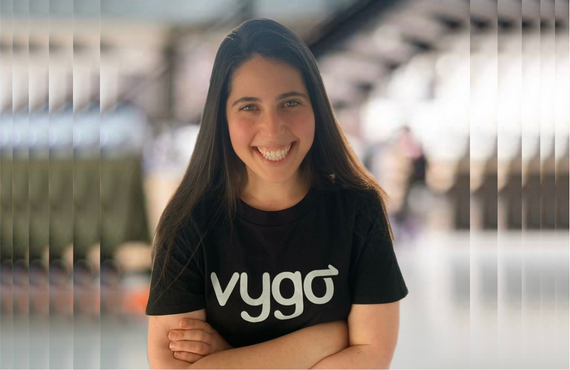How many countries have you worked from? Ashlee Chapman, Head of People & Culture at Vygo, admits she’s lost count: “at least 8 countries that I can think of in the last year… and I’ve worked all around Australia too”.
Ash believes team culture can make or break a business. With trust and enablement embedded in Vygo’s operations, she’s dedicated to unlocking her teams’ potential in work and life, wherever they are. And of course, she’s enjoying demonstrating what’s possible along the way!
Vygo champions learners by connecting university students with the support services they need to succeed, through their world-first platform. Its relevance is global, and so is their team. Vygo’s grown to 25 staff across the UK, Europe, Asia, Australia and the US. Ash is responsible for establishing Vygo as a loved, thriving workplace that continues to attract top talent, wherever it may be.
After an early career in law, Ash joined Vygo as Chief of Staff, with her employment offer uniquely captured by podcast. She soon became indispensable, and saw Vygo ranked in the top 10% of remote workplaces, and tech workplaces, according to CultureAmp engagement data.
Beyond work
Alongside her full professional life, Ash supports others in her personal roles too.
Valuing growth, relationships and justice, she has three younger siblings who she’s committed to guide and support. Ash also provides more formal mentoring (including through Startmate), maintaining three mentees at various stages of their studies or career.
Planning her recent wedding has been a big commitment this year, a theme that will continue as she completes her marriage celebrant studies.
A workplace that enables life
As an avid traveller, Vygo’s all-remote setup enables the life she loves. She’s worked her way across Europe over the past 6 months, and is currently enjoying a month of travelling in Australia with her new spouse.
“The best part about being a traveller at a remote working company is that you maintain stability at work, while engaging in dynamic and new environments.”
Routine and structure help keep clear boundaries between her work and life activities. She’s diligent about keeping her morning exercise time for herself, for example, keeping her attention away from her inbox until she’s ready. It’s a personal mindset choice, but also embedded in Vygo’s culture.
Vygo encourages separate physical spaces for work and life, enabling each team member’s choice of location. Ash enjoys working from home (in a space used exclusively for work), and utilises the café budget for a change of scenery once a week.
With physical distribution comes time autonomy, and Ash steps across that work/life boundary with intention. There’s no problem with taking a 4pm dance class – it’s in her calendar as a personal meeting and her team can work with that.
What not to do
Ash knows the workplace time norms she wants to avoid at Vygo. She’s experienced work in the public sector, where the strict 9-5 schedule provided clear work/life separation, but no flexibility. Conversely, her time at a consulting firm came with the expectation of 24/7 availability.
“I had managers call me mid-dinner dates and request new work, I had zooms at midnights with team members, I had messages on my phone pinging from about 5am. I felt that I had no personal time…
Now I feel totally in control of my own schedule.”
A workplace that enables life
Being distributed in time and space isn’t a problem when you’ve got enabling systems and processes: “We work with an extreme preference for async and record almost all meetings, trainings and events.” Their only compulsory in-sync meeting is a monthly all-hands, and Fridays are kept meeting-free.
The team knows that email and Slack are for work comms only, and phones are reserved for true work emergencies, “which are extremely rare”.
“When I leave my working office, I don’t see any work communications until I re-enter and reboot my work computer the next day. This helps a lot to feel offline.”
Ash is conscious that physically dispersed teams can struggle with connection, particularly between functions that don’t often collaborate on work tasks. But some creative problem solving has helped them level-up in connection and fun.
“We’ve created Company Houses (like Harry Potter) where we have interdisciplinary teams who compete in Company competitions.”
The result is a global talent pool for Vygo, and a growing team of thriving Vygonauts. Win:win.
Curious?
If you’re interested in experiencing work with Ash and the Vygo team, keep an eye on LinkedIn and Vygo’s careers page. I also recommend checking out The Unicorn Launcher, a brilliant podcast series following the start-up’s journey while being coached by the renowned Matt Mochary.

